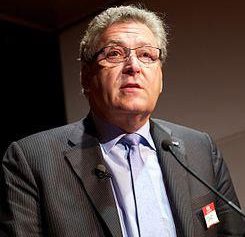Christmas was a big day for President Trump. His first Christmas as
president gave him the opportunity to fulfill a campaign promise
—technically
.
Trump had promised his supporters — many of whom are
upset at the increasing secularization of the Christmas holiday — that
they would be able to say “Merry Christmas” again if they elected him.
On Sunday night, Christmas Eve, Trump tweeted: "People are proud to be saying Merry Christmas again. I am proud to have
led the charge against the assault of our cherished and beautiful
phrase. MERRY CHRISTMAS!!!!!"
Although no American was barred from wishing others a “Merry Christmas”
before Trump entered the White House, some of his supporters were
frustrated, if not angered, by the number of politicians saying “Happy
Holidays” in addition to “Merry Christmas.” President Barack
Obama, Trump’s predecessor,
wished Americans a “Merry Christmas” multiple times when he was president — and continues that tradition to this day.
But some within Trump’s base, especially the white evangelicals who
voted for him in high numbers, are uncomfortable with America
increasingly becoming a multifaith nation.
Evangelical leader Franklin Graham
told
Fox News that it is essential that people know that Christmas is a
Christian holiday. “Christmas is really about the birth of Jesus Christ,
and that's what we're all celebrating,” he said.
But the likelihood of Americans getting on “the same page” as Cobb
and other Trump supporters about the meaning of Christmas is not good.
The majority of Americans do not primarily view Christmas as a religious holiday. According to Pew Research Center
polls,
only 46 percent of Americans celebrate Christmas as primarily a
religious (rather than cultural) holiday, a 5 percent decrease from
2013.
And this doesn’t appear to be changing anytime soon, considering that millennials are even
less likely than older adults to include a religious component in their Christmas celebration.
And
most Americans recognize this, with a majority of adults — 56 percent —
saying the religious aspects of Christmas are less emphasized in
society than in years past.
When asked whether Christian symbols
such as nativity scenes should be allowed on government property,
the percentage of Americans who say such displays should not be allowed
is growing — from 20 percent three years ago to 26 percent today.
Although
most Americans gladly celebrate Christmas and probably will continue to
wish others a “Merry Christmas,” for many Trump supporters, America
won’t truly be great again until Christianity regains its central
position in this increasingly multifaith and secular society.
“Christmas is all about Christ. I'm so excited that the president isn't afraid to mention the name of Jesus Christ,” he added.
But the data suggests that for many Americans, what would make the
nation great is acknowledging the diversity of its citizens' values
while allowing them the freedom to celebrate the birth of Christ as they
please.
Note EU-Digest: Hopefully the Christian community will keep
reminding those of other faiths and Christmas shoppers about, the reason
for the holiday season.
Read more: Majority of Americans do not view Christmas primarily as a religious holiday
 Bulgaria, the EU's poorest member state and seen as its most corrupt,
takes up the rotating presidency of the EU Council from January 1
Bulgaria, the EU's poorest member state and seen as its most corrupt,
takes up the rotating presidency of the EU Council from January 1

